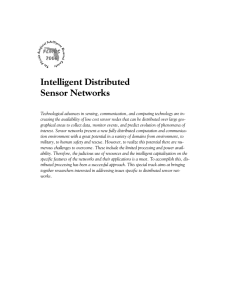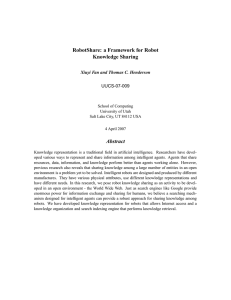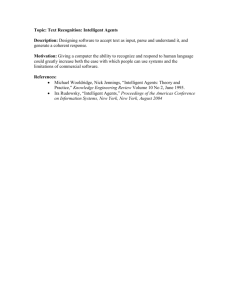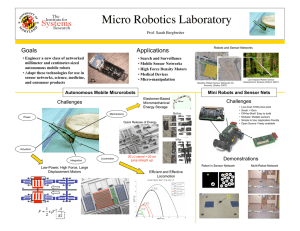Engineering Research Institute - In Robotics, Diagnostics and Control
advertisement
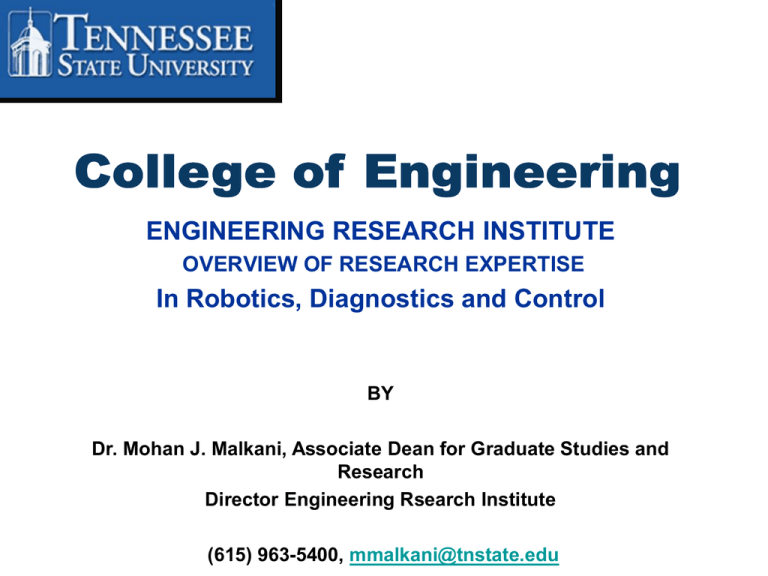
ENGINEERING RESEARCH INSTITUTE OVERVIEW OF RESEARCH EXPERTISE In Robotics, Diagnostics and Control BY Dr. Mohan J. Malkani, Associate Dean for Graduate Studies and Research Director Engineering Rsearch Institute (615) 963-5400, mmalkani@tnstate.edu ENGINEERING ENGINEERINGRESEARCH RESEARCHINSTITUTE INSTITUTE(ERI) (ERI) Research ResearchCenters Centersand andLaboratories Laboratories ● Center for Battlefield Sensor Fusion – ARO (2004) ● Center for Environmental Engineering -- DOE (1996) ● Center for Neural Engineering -- ONR (1992) ● Digital Signal/ Image Processing Laboratory -- Air Force (1991) ● Intelligent Control Systems Laboratory -- NASA (1993) ● Design Methodologies Laboratory -- NASA (1993) ● Intelligent Manufacturing Laboratory -- SME,ONR (1994) ● Intelligent Health Monitoring Laboratory -- PSU/MURI-DURIP (1998) ● Computer and Information Systems Laboratory -- DOD/HP (1996,99) ● Automatic Target Recognition (ATR) Test-bed --- AFRL (2006-2008) ERI MISSION ERI ERI Conducts Conducts Research Research in “Cutting-Edge Technology” Technology” Areas Some ERI sample strengths are: Artificial Intelligence/NN/FL/GA Database Design&Data Mining Parallel&Distributed Computing Modeling, Simulation & Analysis Speaker Recognition Signal/ Image Processing Intelligent Control Systems Intelligent Health Monitoring Robotics and Automation Intelligent Manufacturing Human-Machine Interfaces Sensors and Machine Vision CAD/CAM/CAE Tools Wireless Communication Automatic Target Recognition Cyber Security Environmental Remediation Probabilistic Design Methodologies SMALL BUSINESS TECHNOLOGY TRANSFER (STTR) PROGRAM NASA 1994 PHASE I (PROPOSALS SELECTED FOR FUNDING OF STTR PHASE I CONTRACTS) SMALL SCALE ROBOTICS ● MID-SOUTHE ENGINEERING, INC. TENNESSEE STATE UNIVERSITY Spherical Motor and Neural Controller for Micro Precision Robot Wrist ● ROBOTICS RESEARCH CORPORATION JET PROPULSION LABORATORY Next Generation Controller for Redundant Robots ● TRANSITIONS RESEARCH CORPORATION UNIVERSITY OF SOUTHERN CALIFORNIA Combined Distance and Orientation Sensor (CODOS) ● AMHERST SYSTEMS, INC. STATE UNIVERSITY OF NEW YORK AT BUFFALO Foveal Sensor and Image Processor Prototype ● AEROMOVER SYSTEMS CORPORATION ● ENDOROBOTICS CORPORATION THE UNIVERSITY OF MICHIGAN UNIV OF CALIFORNIA BERKELEY Differentiated Universal End Effector Milli-Robots for Surgical Teleoperation ● VISUAL INSPECTION TECHNOLOGIES, INC., SRI INTERNATIONAL Mobile Magnetic Robots for Inspection of Steel Structures Center for Neural Engineering - Funded by ONR 1992 - 2004 AFRL Health Monitoring Of NASP Hypersonic Structures 1991-1995 VA DOE Localization Of Ventricular Arrhythmogenic Foci Chaos Control In A Fluidized Bed 1996-1999 Lockheed Martin Predictive Maintenance 1995-Present 1994-1996 CALTECH Intelligent fault diagnosis tools 1996-1998 1996-1999 1998-2003 Virtual Tandem Vehicles- Mobility Controller For Mobile Robots Signal / Noise Separation & Blind Deconvolution 1994 1997-1998 1994-1995 NASA/JPL Visual Telerobotic Task Planning Of Cooperative Robots Using Soft Computing 1998-2000 2003-2005 Applied Research Lab - Penn. State University CBM of bearing and data acquisition Integrated predictive diagnosis for helicopter gear box 1997-1998 1997-1998 Physics- based modeling of bearing 1998-1999 NASA Robust Integrated Neurocontroller For Complex Dynamic Systems 1992-Present NSF ARMY TACOM Towards Telepresence Using Mobile Robots STTR In Robotics Nn Classification For Digital Communication Biologically Motivated NN (PCNN) & Mobile Robots 2000-2003 NSA NASA ONR Embodiment of Intelligent Behaviors on Mobile Robots Helicopter Control using NN, FL, GA NASA Intelligent ControlWind Power Analysis NASA ARC ONR 1995-Present NSF DOE 1993-1996 NASA Boeing Intelligent Aircraft Controller 1995-1996 Boeing Air To Air Campaign Thunder Model Using Genetic Algorithms 1998-1999 Measure of effectiveness & performance for AI based monitoring systems Simulation based design using PDM, FEA & SM 1998-1999 1999-2000 April 2005 CONDITION BASED MAINTENANCE Signal Processing Data Acquisition 40 40 0.2 0 0.05 0.1 -0.2 0 0.1 0.2 0.3 0.4 0.5 Time (seconds) 10 0 15 20 15 25 0.6 0.7 20 0.8 -0.2 -0.3 -0.1 -0.4 -0.15 -0.5 0 -0.2 -0.6 0 0 -0.1 -0.05 -0.1 -0.4 20 10 0.1 Filtered Signal 0.1 0.3 0.2 Filtered Signal 60 60 0.2 0.4 Filtered Signal 80 80 Acceleration waveform at Left Bearing Vertical(No Load) 0.3 0.6 -0.3 -0.4 -0.2 0 -0.5 0 0.1 0.1 0.2 0.1 0.2 0.3 0.4 0.5 Time (seconds) 0.6 0.7 0.3 0.4 0.5 0.6 Time (seconds) 0.2 0.7 0.8 0.3 0.4 0.5 0.6 Time (seconds) 0.7 0.8 0.8 Critical System Components 60 Features Extraction Feature Vector Set Selection for Fault Diagnosis 50 40 30 20 Neural-Network Selection for Fault Diagnosis 10 0 Novelty Faults Banks of Neural Networks Fault Pattern Recognition Fault Pattern Classification) Diagnostics & Prognostics Rule-Based Fault Reasoning Diagnostic Data Fusion Causality Reasoning Tennessee State University Department of Electrical and Computer Engineering Intelligent Control Systems (ICS) Lab (Dr. Saleh Zein-Sabatto, mzein@tnstate.edu) Intelligent Control Systems Research Work “Control and Coordination of Multiple Unmanned Areal Vehicles (UAVs)” Testing & Simulation Design & Modeling Hardware Prototyping Penn State - DARPA - MURI Project Autonomous Surveillance Perspectives Speech Recognition by Mobile Robots TSU will develop mapping that will be used by consortium partners Soldiers Recognize Commands and act TSU TSURobotics Robotics Lab Lab Kinematic and Dynamic Module Communication Protocols Scheduling and Synchronization Schemes Man-Machine Interface Static/Dynamic Parameters Neural-Network Terrain Learning Module Physical Environment Wireless Communication Module Signal/Image Processing Schemes Sensory Info Acquisition & Fusion Integrated Mobility Supervisory Controller Distributed FMCell Simulation Environment Fuzzy-Logic Motion Controller Module Behavior-based Cooperative Tactical Strategies Algorithmic Supportive Tools Three small mobile robots communicate and follow the commander Genetic-Algorithm Tactical Formation Module Behavior-based Navigation Module World Perception Modeling Module Diagnostic and Conflicts Handling Module ROBOTIC COMMUNICATION Sensors Technology Thrust Research-AFRL (2006-2008) • • • • • • • • • Automatic Target Recognition- TSU (Lead) Electro-Optics - University of Dayton (Lead) Radio Frequency- Louisiana State Univ. (Lead) ATR Consortium Member Universities: Louisiana Tech University Michigan State University Prairie View A & M University North Carolina A &T State University Chaminade University of Hawaii ATR Test-Bed (ATRTB) Electric Helicopter and 7 Cameras Surveillance System Student Research Participations UAV at TSU Campus Camera Surveillance System at TSU ●C1 ●C5 ●C4 ●C2 ●C7 ●C3 Participations Faculty ●C6 Energy Efficient Wireless Multimedia Sensor Networks (Supported by AFRL-- ATR Project, 2007 - 2008) • Objective Develop a test-bed for energy efficient multi-hop wireless multimedia sensor networks to explore design tradeoffs in crosslayer protocols, error control schemes, mesh image/video transmission, etc. Heterogeneous Motes • Wireless Multimedia Sensor Networks Test-bed Clients Clients Server Access Point Internet Tier 3 802.11 Gateway Tier 2 Low-resolution camera Tier 1 Robot with high resolution camera Helicopter with high-resolution camera Tier 4 802.15.4/zigbee motes with sensors and low-resolution cameras Research Project for the Minority Leaders Sensors Program (Funded by AFRL, 2007 – 2008) Cross-Layer Design of Cognitive Networks with MIMO Technology Objectives Leverage MIMO technology in a cross-layer fashion involving network architecture, PHY, MAC, and routing protocols to multioptimize networking performance and maximize network life in wireless sensor networks (WSNs) Approach Cross-Layer Design MIMO-aware Hierarchical Network Architecture with link-jumping and head-rotation – enabling efficient routing – inexpensive self-reconfiguration MultiOptimal-MAC Protocol – a CSMA/CA based MAC with a multi-optimizer Efficient Routing Algorithms – short and robust: maximize network throughput and network lifetime Testing and Evaluation – Test Modeling & Test-Bed – Performance Evaluation MIMO Technology Without using extra energy and channel, a MIMO transceiver can be used to • Extend transmission range, or reducing error rate at links by using diversity gain • Increase data rate at links by using multiplexing gain MIMO transceiver T×1 R×1 T×2 R×2 T×M R×M MIMO sensor network diversity gain multiplexing gain CENTER OF EXCELLENCE FOR BATTLEFIELD SENSOR FUSION (ARO) RESEARCH FOCUS AREAS Systematic sensor data & information fusion Sensors networking in battlefield situations Multiple target identification and tracking Battlefield source allocation and management Networks modeling and simulation Network performance measurements Experimental testing & evaluation of sensor network concepts. ` PARTNERSHIPS / CONTRACTS TACOM BRC Bevilacqua Research Corporation 2007-2008 ERI Funded Research projects 1. Center for Excellence in Battlefield Sensor Fusion, funded by Army Research Office (ARO) $2,331,255.(2004-2009)-Dr. Shirkhodaie (PI) 2. Multi-Mode UAV Sensor Technologies (Multi-MUST), funded by WPAFB, Air Force Research laboratory (AFRL)$137,000(2006-2007)-Dr. Shirkhodaie (PI) 3. Surface and Partially Buried UXO Identification, discrimination, and Localization Based on Cognitive Imagery Techniques, funded by Tyndall, AFRL $160,000 (20062007)-Dr. Shirkhodaie (PI) 4. Sensors Technology Thrust Research—(Automatic Target Recognition)-AFRL $780,000 (2006-2008)Dr. Mohan Malkani (PI) 5. Neural-Fuzzy Modeling in Model-Based Fault Detection, Isolation, Control Adaptation and Reconfiguration in Turbine Engines—funded by Propulsion Directorate (AFRL)---$ 288,520 (2007-2010)—Dr. Zein-Sabatto (PI) 6. Visual Telerobotic Task Planning of Cooperative Robots based on Soft Computing, funded by NASA/JPL $300,000 (2004-2007)-Dr. Shirkhodaie (PI) 7.Human Systems Integration (Seating Comfort)—Boeing--$750,000( 2007-2010)- Dr. Onyebueke (PI) 8..Cybersecurity-ORNL/BWXT Y-12 ---$538,149 Dr. Decatur B. Rogers (PI) (2207-2010) 9. Intelligent Cognitive inspection System for Manufacturing Process Automated Reasoning and Decision Making—funded by Rolls Royce--$90,000 (200-2007)-Dr. Shirkhodaie (PI) 10. Failure Mode and Criticality Analysis of Maintenance Issue --funded by Aerospace Testing Alliance $50,000—Dr. Devgan (PI) STRONG POINTS OF OUR RESEARCH CAPABILITIES Suite of Digital Signal Processing Tools Advanced Intelligence Tools: Neural Networks, Fuzzy Logic and Genetic Algorithms Fault Detection and Health Monitoring Intelligent Control System: Aircraft, Helicopter Modeling, Simulation and Analysis Systems Engineering Mobile Robot Navigation Sensor Fusion Data Mining Computer Integrated Manufacturing Integrated Design Methodologies - FEM, SM and PDM Patents and Technology Transfer Information Technologies
